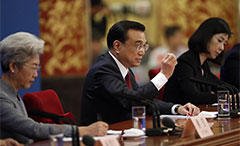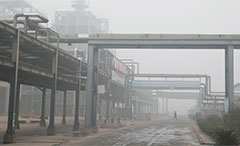Ministers respond to public concerns
2017-01-13
english.gov.cn
Around the new year, ministers at State Council departments put forward many measures to address public concerns about air pollution control, China’s economy, tax reform and other issues in response to Premier Li Keqiang’s directive on issuing active responses.
“For market players’ suggestions and the public’s major concerns, all State Council departments should actively bear their respective responsibilities and make timely responses,” Premier Li said again during this year’s first State Council executive meeting on Jan 4.
Air pollution control

China has seen small progress in environment improvement, while facing more challenges in air pollution control in the winter, said Chen Jining, minister of environmental protection, at a news conference on Jan 6.
The minister put forward six measures to control air pollution in the winter, concerning coal-fired furnace decreases, bulk coal management in outskirts and rural areas, peak shifting in manufacturing, improvement in emission standards, overhaul of polluting firms, and vehicle management.
Smog monitoring and research
Ma Xiaowei, vice-director of the National Health and Family Planning Commission, represented major tasks to control smog during the State Council policy briefing on Dec 23, 2016.
According to the vice-director, the department would build 126 spots nationwide monitoring human health conditions affected by air pollution, and strengthen research on the impact of air pollution on human health.
Continued efforts to control smog in Beijing
Progress has been seen after Beijing rolled out measures to overhaul bulk coal in rural areas, manage high-emissions vehicles, and step up air pollution control in rural-urban fringe areas, said Cai Qi, acting mayor of Beijing, while meeting with media and citizen representatives on Jan 7.
However, more efforts should be made to fight air pollution to meet public expectations, Cai said.
China’s economy

China’s economy has maintained stable development in 2016, and the GDP growth rate in 2016 is expected to remain at 6.7 percent, said Xu Shaoshi, director of the National Development and Reform Commission, at a news conference of the State Council Information Office on Jan 10.
Instead of stimulating demand, China formed regulations to control various risks, keeping the economy within a reasonable range, Xu added.
Progress in tax reform

A total of 499.9 billion yuan ($72.5 billion) has been saved from January to November in 2016, due to the implementation of reform that replaced the business tax with value-added tax, said Wang Jun, head of the State Administration of Taxation, at a policy briefing on Dec 27, 2016.
The department will continue efforts to put the tax reform in place in 2017 to ensure that taxes will be reduced in all industries. Efforts will also be made to improve policies and increase services supply to help enterprises reduce burdens.
Tax increase to be addressed
About 1.5 percent of tax payers were levied more taxes due to unclear policies and lack of tax exemption policies, according to Xiao Jie, minister of finance, in an interview on Dec 29, 2016.
Financial departments will continue to step up policy promotion, improve tax payment services, and encourage enterprises to improve their management modes to adapt to tax reform.
Easier business registration

China created measures to reform the business system in 2016, including integrating five registration documents into one starting in October, said Zhang Mao, head of the State Administration for Industry and Commerce, in an interview on Dec 22, 2016.
We will continue to promote the integration of registration documents in 2017, Zhang said.
Major tasks in medical reform

Wang Hesheng, vice-director of the National Health and Family Planning Commission, put forward major tasks to promote medical reform in the 13th Five-Year Plan period at the State Council policy briefing on Dec 23, 2016.
The tasks are making breakthroughs in five mechanisms, including a hierarchical treatment system, modern hospital management system, medical insurance system, drug supply system and supervision mechanism.
In addition, the tasks highlighted further reform in related fields, such as personnel training and public health services.
Healthcare for elderly people
Ma Xiaowei, vice-director of the National Health and Family Planning Commission, called for more efforts to improve healthcare for elderly people, at the State Council policy briefing on Dec 23, 2016.
The department will make efforts to develop diagnosis standards to identify whether they are able to take care of themselves, put together a batch of nursing teams going to the homes and communities where the elderly live, establish a nursing system covering communities and institutions, and set up a related insurance system.


